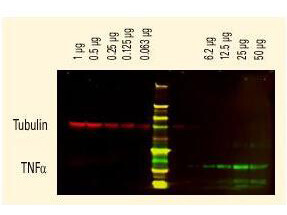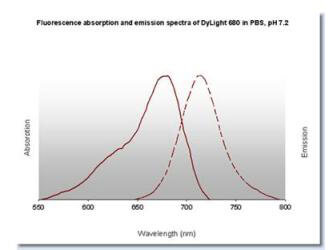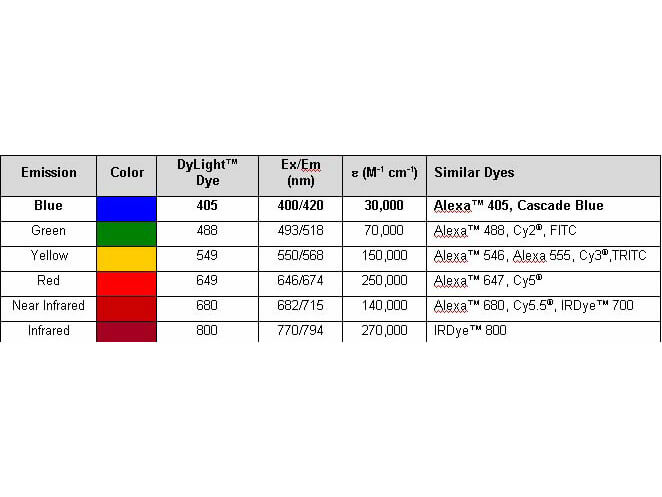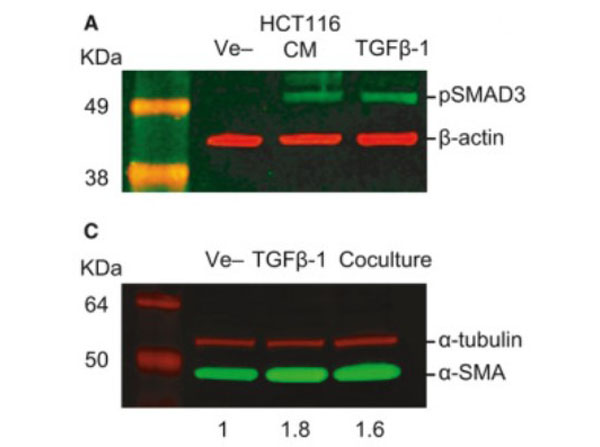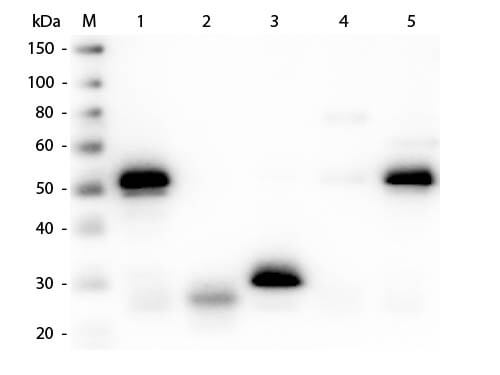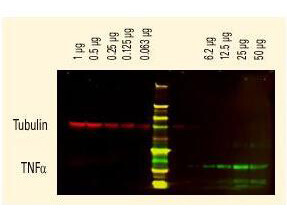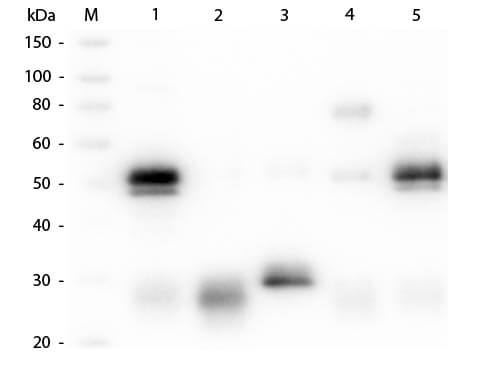Rabbit IgG (H&L) Antibody DyLight™ 680 Conjugated
Goat Polyclonal
35 References
611-144-002
611-144-002-0.5
100 µg
5 x 100 µg
Lyophilized
Lyophilized
WB, IF, Dot Blot, IP
Rabbit
Goat
Shipping info:
$50.00 to US & $70.00 to Canada for most products. Final costs are calculated at checkout.
Product Details
Goat Anti-Rabbit IgG (H&L) Antibody DyLight™ 680 Conjugated - 611-144-002
Goat anti-Rabbit IgG Antibody DyLight™680 Conjugation, Goat anti-Rabbit IgG DyLight™ 680 Conjugated Antibody
Goat
IgG (H&L)
DyLight™ 680
Polyclonal
IgG
2.8
Target Details
Rabbit
Rabbit IgG whole molecule
This product was prepared from monospecific antiserum by immunoaffinity chromatography using Rabbit IgG coupled to agarose beads followed by conjugation to fluorochrome and extensive dialysis against the buffer stated above. Assay by immunoelectrophoresis resulted in a single precipitin arc against anti-Goat Serum, Rabbit IgG and Rabbit Serum. This antibody will react with heavy chains of Rabbit IgG and with light chains of most Rabbit immunoglobulins.
Application Details
Dot Blot, WB
IF, IP
- View References
Anti-Rabbit IgG Antibody DyLight™680 has been tested by dot blot and western blot and is designed for immunofluorescence microscopy, fluorescence based plate assays (FLISA) and fluorescent western blotting. This product is also suitable for multiplex analysis, including multicolor imaging, utilizing various commercial platforms. The emission spectra for this DyLight™ conjugate match the principle output wavelengths of most common fluorescence instrumentation.
Formulation
1.0 mg/mL by UV absorbance at 280 nm
0.02 M Potassium Phosphate, 0.15 M Sodium Chloride, pH 7.2
0.01% (w/v) Sodium Azide
10 mg/mL Bovine Serum Albumin (BSA) - Immunoglobulin and Protease free
100 µL
Restore with deionized water (or equivalent)
Shipping & Handling
Ambient
Store vial at 4° C prior to restoration. For extended storage aliquot contents and freeze at -20° C or below. Avoid cycles of freezing and thawing. Centrifuge product if not completely clear after standing at room temperature. This product is stable for several weeks at 4° C as an undiluted liquid. Dilute only prior to immediate use.
Expiration date is one (1) year from date of receipt.
Anti-Rabbit IgG Antibody DyLight™680 generated in goat detects rabbit IgG. Secreted as part of the adaptive immune response by plasma B cells, immunoglobulin G constitutes 75% of serum immunoglobulins. Immunoglobulin G binds to viruses, bacteria, as well as fungi and facilitates their destruction or neutralization via agglutination (and thereby immobilizing them), activation of the compliment cascade, and opsonization for phagocytosis. The whole IgG molecule possesses both the F(c) region, recognized by high-affinity Fc receptor proteins, as well as the F(ab) region possessing the epitope-recognition site. Both heavy and light chains of the antibody molecule are present. Secondary Antibodies are available in a variety of formats and conjugate types. When choosing a secondary antibody product, consideration must be given to species and immunoglobulin specificity, conjugate type, fragment and chain specificity, level of cross-reactivity, and host-species source and fragment composition. This Anti-Rabbit IgG (H&L) is conjugated to DyLight™680.
Li L et al. (2024). Microglia Autophagy Mediated by TMEM166 Promotes Ischemic Stroke Secondary to Carotid Artery Stenosis. Aging Dis.
Applications
IF, Confocal Microscopy; WB, IB, PCA
Cantacorps L et al. (2023). Gut-derived peptide hormone receptor expression in the developing mouse hypothalamus. PLoS One.
Applications
WB, IB, PCA
Szewczyk B et al. (2023). FUS ALS neurons activate major stress pathways and reduce translation as an early protective mechanism against neurodegeneration. Cell Rep.
Applications
WB, IB, PCA
Lopez J et al. (2023). The ribosomal S6 kinase 2 (RSK2)-SPRED2 complex regulates the phosphorylation of RSK substrates and MAPK signaling. J Biol Chem.
Applications
WB, IB, PCA
Cuevas-Navarro A et al. (2023). RAS-dependent RAF-MAPK hyperactivation by pathogenic RIT1 is a therapeutic target in Noonan syndrome-associated cardiac hypertrophy. Sci Adv.
Applications
WB, IB, PCA
Tao, X et al. (2022). Phenylbutyrate modulates polyamine acetylase and ameliorates Snyder-Robinson syndrome in a Drosophila model and patient cells. Jci Insight
Applications
WB, IB, PCA
Orengo, JP et al. (2022). Reduction of mutant ATXN1 rescues premature death in a conditional SCA1 mouse model. JCI Insight
Applications
WB, IB, PCA
Alegre-Zurano L et al. (2022). Cannabidiol decreases motivation for cocaine in a behavioral economics paradigm but does not prevent incubation of craving in mice. Biomed Pharmacother.
Applications
WB, IB, PCA
García-Baos A et al. (2022). Effects of fast-acting antidepressant drugs on a postpartum depression mice model. Biomed Pharmacother.
Applications
WB, IB, PCA
Doerfler AM et al. (2022). LPA disruption with AAV-CRISPR potently lowers plasma apo(a) in transgenic mouse model: A proof-of-concept study. Mol Ther Methods Clin Dev.
Applications
WB, IB, PCA
Nitschke L et al. (2021). Modulation of ATXN1 S776 phosphorylation reveals the importance of allele-specific targeting in SCA1. JCS Insight.
Applications
WB, IB, PCA
Castro-Zavala A et al. (2021). Cocaine-seeking behaviour is differentially expressed in male and female mice exposed to maternal separation and is associated with alterations in AMPA receptors subunits in the medial prefrontal cortex. Prog Neuropsychopharmacol Biol Psychiatry.
Applications
Undefined
De Giorgi M et al. (2021). Targeting the Apoa1 locus for liver-directed gene therapy. Mol Ther Methods Clin Dev.
Applications
WB, IB, PCA
Cuevas-Navarro A et al. (2021). The RAS GTPase RIT1 compromises mitotic fidelity through spindle assembly checkpoint suppression. Curr Biol.
Applications
WB, IB, PCA
Garcia-Baos A et al. (2021). Cannabidiol attenuates cognitive deficits and neuroinflammation induced by early alcohol exposure in a mice model. Biomed Pharmacother.
Applications
WB, IB, PCA
Woods BL. et al. (2020). Interplay of septin amphipathic helices in sensing membrane-curvature and filament bundling. bioRxiv
Applications
WB, IB, PCA
Asthana V et al. (2020). Development of a Novel Class of Self-Assembling dsRNA Cancer Therapeutics: a Proof of Concept Investigation. Mol Ther Oncolytics.
Applications
WB, IB, PCA
Li R et al. (2020). RNF115 deletion inhibits autophagosome maturation and growth of gastric cancer Cell Death Dis.
Applications
WB, IB, PCA
Ma X et al. (2020). Nicotinamide mononucleotide adenylyltransferase uses its NAD+ substrate-binding site to chaperone phosphorylated Tau. Elife.
Applications
WB, IB, PCA
Cantacorps L et al. (2020). Prenatal and postnatal alcohol exposure increases vulnerability to cocaine addiction in adult mice. Br J Pharmacol.
Applications
WB, IB, PCA
Alegre-Zurano L et al. (2020). Behavioural and molecular effects of cannabidiolic acid in mice. Life Sci.
Applications
WB, IB, PCA
Hong D et al. (2019). Deletion of TMEM268 inhibits growth of gastric cancer cells by downregulating the ITGB4 signaling pathway. Cell Death Differ.
Applications
WB, IB, PCA
Bailetti AA et al. (2019). Enhancer of Polycomb and the Tip60 complex repress hematological tumor initiation by negatively regulating JAK/STAT pathway activity. Dis Model Mech.
Applications
WB, IB, PCA
Lin et al. (2018). Liver-specific deletion of Eva1a/Tmem166 aggravates acute liver injury by impairing autophagy. Cell Death & Disease
Applications
WB, IB, PCA
Haapalainen et al. (2018). Expression of CPPED1 in human trophoblasts is associated with timing of term birth. Journal of Cellular and Molecular Medicine
Applications
WB, IB, PCA
Jarrett KE et al. (2018). Somatic Editing of Ldlr With Adeno-Associated Viral-CRISPR Is an Efficient Tool for Atherosclerosis Research. Arteriosclr Thromb Vasc Biol.
Applications
WB, IB, PCA
Jarrett et al. (2017). Somatic genome editing with CRISPR/Cas9 generates and corrects a metabolic disease. Scientific Reports
Applications
WB, IB, PCA
Li et al. (2017). Deletion of Pdcd5 in mice led to the deficiency of placenta development and embryonic lethality. Cell Death & Disease
Applications
WB, IB, PCA
Xia et al. (2017). Knockout of MARCH2 inhibits the growth of HCT116 colon cancer cells by inducing endoplasmic reticulum stress. Cell Death & Disease
Applications
WB, IB, PCA
Moscoso-Castro M et al. (2017). Cognitive impairments associated with alterations in synaptic proteins induced by the genetic loss of adenosine A2A receptors in mice. Neuropharmacology.
Applications
WB, IB, PCA
Shen et al. (2016). EMC6/TMEM93 suppresses glioblastoma proliferation by modulating autophagy. Cell Death & Disease
Applications
WB, IB, PCA
Xia D et al. (2016). MARCH2 regulates autophagy by promoting CFTR ubiquitination and degradation and PIK3CA-AKT-MTOR signaling. Autophagy.
Applications
WB, IB, PCA
Palacino J et al. (2015). SMN2 splice modulators enhance U1–pre-mRNA association and rescue SMA mice. Nat Chem Biol.
Applications
WB, IB, PCA
Wang Z et al. (2014). PHF23 (plant homeodomain finger protein 23) negatively regulates cell autophagy by promoting ubiquitination and degradation of E3 ligase LRSAM1. Autophagy.
Applications
IP, Co-IP
Li Y et al. (2013). A novel ER-localized transmembrane protein, EMC6, interacts with RAB5A and regulates cell autophagy. Autophagy.
Applications
WB, IB, PCA
This product is for research use only and is not intended for therapeutic or diagnostic applications. Please contact a technical service representative for more information. All products of animal origin manufactured by Rockland Immunochemicals are derived from starting materials of North American origin. Collection was performed in United States Department of Agriculture (USDA) inspected facilities and all materials have been inspected and certified to be free of disease and suitable for exportation. All properties listed are typical characteristics and are not specifications. All suggestions and data are offered in good faith but without guarantee as conditions and methods of use of our products are beyond our control. All claims must be made within 30 days following the date of delivery. The prospective user must determine the suitability of our materials before adopting them on a commercial scale. Suggested uses of our products are not recommendations to use our products in violation of any patent or as a license under any patent of Rockland Immunochemicals, Inc. If you require a commercial license to use this material and do not have one, then return this material, unopened to: Rockland Inc., P.O. BOX 5199, Limerick, Pennsylvania, USA.

